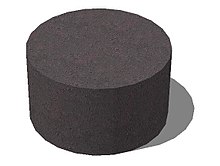Marshall specimen
The Marshall test specimen ( MPK for short ) is a standard specimen for testing rolled asphalt . Among other things, it is used to determine the spatial density as well as the Marshall stability and the Marshall flow value with the help of the Marshall experiment . The quality of the asphalt mix can be determined from these parameters . The asphalt mix comes either from a mix sample from the construction site or is specially produced in the laboratory.
Test specimen production
The test specimen has the shape of a cylinder with a diameter of 101.6 ± 0.1 mm and a height of 63.5 ± 2.5 mm. First, the mixture, heated to a certain temperature (135 ± 5 ° C), is loosely filled into a steel mold and compacted in the Marshall compactor by 50 blows of a drop hammer from a height of 46 cm on each side of the sample. The resulting MPK is shaped after it has cooled to around room temperature .
Spatial density determination
To determine the volume density, the MPK are weighed three times. First dry, then under water, then the briefly drained test specimen. So you can determine the volume and from that the spatial density. This process corresponds to the Archimedean principle .
literature
- S. Velske, H. Mentlein, P. Eymann: Road construction technology . Werner Verlag, Düsseldorf 2013, ISBN 978-3-8041-3883-4 .
